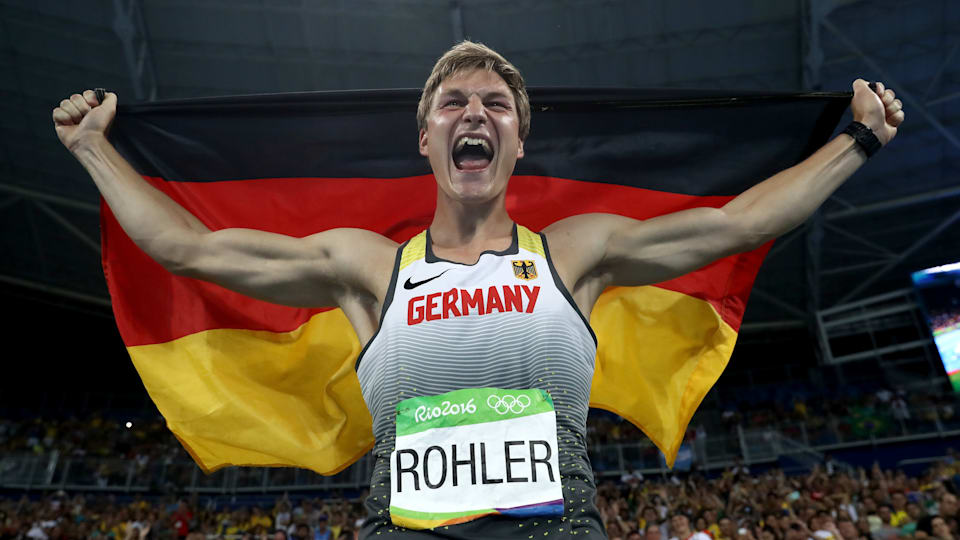Thomas Rohler on how to 'avoid being average'
Find out why the javelin Olympic champion believes it's important to fail in Olympic State of Mind, the new Bridgestone Olympic Channel experience.

Thomas Rohler marked his Olympic debut at Rio 2016 by winning Olympic gold.
While many athletes may struggle to find the same focus after achieving their ultimate goal, the javelin thrower is more motivated than ever to retain his title at Tokyo 2020.
As part of new Bridgestone Olympic Channel experience Olympic State of Mind, Rohler demonstrates how he uses mindfulness, visualisation, and self awareness in order to stay humble, and achieve his best results from his body when it matters most.
Anyone can use these techniques in their daily life, and the goal of Olympic State of Mind is to help people to be the best version of themselves.
Learning these methods is made easy through interviews with elite sports stars and medical professionals, informative articles, quizzes, and interactive games.
Motivation from within
In any individual sport, elite athletes must harness their motivation from within.
But with only themselves to rely on, it is perhaps of even more importance that these particular types of athlete pay special attention to their mental health, when seeking optimum physical performance.
"There is not one thing that motivates me," Rohler told Olympic Channel.
"I have a tool box of things that are going to help me stay self-confident and motivated to achieve my dream" - Thomas Rohler to Olympic Channel
"All the guys out there are a physically able to throw the javelin far, but it is the one that's able to put it on the track on the specific day, for me it's 50/50 important. If I'm not 100% mentally recovered I can't have a good training (session).
"I really try to motivate myself with small challenges and small improvements, which gives me this constant flow of being motivated in a positive way."
Motivation evolution
When Rohler became Olympic champion at just 24-years-old, he had achieved his primary athletic ambition, fuelled solely by an ambition to the gold medal.
"Winning is like a Christmas present," he continued to Olympic Channel
"It gives me a super big boost, makes you feel good, and motivates you further to put in the work.
"If you always come fourth or eighth, you really don't know what you do it for. you can actually become addicted to winning for this boost. We just love it."
However, he realised that he could shift his goals, and retain the same level of motivation heading towards Tokyo 2020.
Through setting the new, and perhaps more difficult, goal of retaining his Olympic title, Rohler was able to retain his level of performance and win the 2018 European Championships.
"Motivation during a career changes. Once I became Olympic champion in Rio, that was a dream (come true).
"No doubt I want to become a double Olympic champion, it gives me goosebumps even talking about it. the Olympics are super special to me and i want to make it again, but at the same time i know it's super tough and this is motivation.
"(At Tokyo 2020), ten guys will be able to throw over 90 metres, but it's all about the day of competition - results before don't help."
Self awareness & visualisation
Physical fitness is one of the greatest barriers athletes need to overcome when seeking their peak performance, and Roher attributes self awareness to his success in staying relatively injury-free.
"Self awareness is crucial in sports because it prevents you from ending up with an injury. If you're not aware of your body, it gets you into dangerous situations.
"The javelin puts a tonne of weight onto your back. We go into dangerous levels and need to feel our bodies: What feels good, what feels bad... 'OK there is 5% more intensity I can give in training.' If you go too much, the next day in training you can only give 60%, so self awareness is crucial.
A staple of any elite sports event these days is to see athletes listening to music before performing, in order to prepare mentally.
Rohler, however, bucks this trend.
"I am one of the athletes that doesn't use music in the warm up because I want to stay mentally clear in the situation of the competition venue.
"Becoming a thrower, you start with imagination. I use visualisation for part of the throw, not the complete movement, but I try to focus on small things."
Avoiding the 'daily average'
"I very much think that people from outside of sports can learn a lot from sports," Rohler continued to Olympic Channel.
"Often in normal business I feel like people get a little stuck in, let's call it the 'daily average'. In sports we wake up naturally motivated because it's competitive in a positive way.
"We know it's not problem to lose one day, to have a tough session, and to fail, but we know it's a problem to be average because then you won't get anywhere and become an Olympian."
"It's actually good in normal society to be average because no one will see you and shout at you, but in sports you can't even make a living if you're average."
Thomas ROHLER
How to tap into Thomas Rohler's Olympic state of mind
The interactive experience is now live on Olympic Channel.
Keep an eye out for the video clips, articles, quizzes and games for you to watch, read, and play, plus a special episode of the Olympic Channel Podcast.
